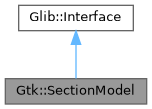Interface that adds support for section to list models. More...
#include <gtkmm/sectionmodel.h>

Public Member Functions | |
| SectionModel (SectionModel &&src) noexcept | |
| SectionModel & | operator= (SectionModel &&src) noexcept |
| ~SectionModel () noexcept override | |
| GtkSectionModel * | gobj () |
| Provides access to the underlying C GObject. | |
| const GtkSectionModel * | gobj () const |
| Provides access to the underlying C GObject. | |
| std::pair< guint, guint > | get_section (guint position) const |
| Query the section that covers the given position. | |
| void | sections_changed (guint position, guint n_items) |
| This function emits the signal_sections_changed() signal to notify about changes to sections. | |
| Glib::SignalProxy< void(guint, guint)> | signal_sections_changed () |
Static Public Member Functions | |
| static void | add_interface (GType gtype_implementer) |
| static GType | get_type () |
| Get the GType for this class, for use with the underlying GObject type system. | |
Protected Member Functions | |
| SectionModel () | |
| You should derive from this class to use it. | |
| virtual void | get_section_vfunc (guint position, guint &out_start, guint &out_end) |
| Return the section that covers the given position. | |
Related Symbols | |
(Note that these are not member symbols.) | |
| Glib::RefPtr< Gtk::SectionModel > | wrap (GtkSectionModel *object, bool take_copy=false) |
| A Glib::wrap() method for this object. | |
Detailed Description
Interface that adds support for section to list models.
This support is then used by widgets using list models to be able to group their items into sections.
Many GTK list models support sections inherently, or they pass through the sections of a model they are wrapping.
A Gtk::SectionModel groups successive items into so-called sections. List widgets like Gtk::ListView then allow displaying section headers for these sections.
When the section groupings of a model changes, the model will emit signal_sections_changed() by calling the sections_changed() function. All sections in the given range now need to be queried again.
Gio::ListModel::signal_items_changed() has the same effect, all sections in that range are invalidated, too.
- See also
- Gio::ListModel, Gtk::ListView
Constructor & Destructor Documentation
◆ SectionModel() [1/2]
|
protected |
You should derive from this class to use it.
◆ SectionModel() [2/2]
|
noexcept |
◆ ~SectionModel()
|
overridenoexcept |
Member Function Documentation
◆ add_interface()
◆ get_section()
| std::pair< guint, guint > Gtk::SectionModel::get_section | ( | guint | position | ) | const |
Query the section that covers the given position.
The number of items in the section can be computed by out_end - out_start.
If the position is larger than the number of items, a single range from n_items to G_MAXUINT will be returned.
- Parameters
-
position The position of the item to query.
- Returns
- {out_start, out_end} The position of the first item in the section, and the position of the first item not part of the section anymore.
◆ get_section_vfunc()
|
protectedvirtual |
Return the section that covers the given position.
If the position is outside the number of items, returns a single range from n_items to G_MAXUINT.
◆ get_type()
|
static |
Get the GType for this class, for use with the underlying GObject type system.
◆ gobj() [1/2]
|
inline |
Provides access to the underlying C GObject.
◆ gobj() [2/2]
|
inline |
Provides access to the underlying C GObject.
◆ operator=()
|
noexcept |
◆ sections_changed()
| void Gtk::SectionModel::sections_changed | ( | guint | position, |
| guint | n_items | ||
| ) |
This function emits the signal_sections_changed() signal to notify about changes to sections.
It must cover all positions that used to be a section start or that are now a section start. It does not have to cover all positions for which the section has changed.
The Gio::ListModel::signal_items_changed() implies the effect of the signal_sections_changed() signal for all the items it covers.
It is recommended that when changes to the items cause section changes in a larger range, that the larger range is included in the emission of the Gio::ListModel::signal_items_changed() instead of emitting two signals.
- Parameters
-
position The first changed item. n_items The number of changed items.
◆ signal_sections_changed()
| Glib::SignalProxy< void(guint, guint)> Gtk::SectionModel::signal_sections_changed | ( | ) |
- Slot Prototype:
void on_my_sections_changed(guint position, guint n_items)
Flags: Run Last
Emitted when the start-of-section state of some of the items in model changes.
Note that this signal does not specify the new section state of the items, they need to be queried manually. It is also not necessary for a model to change the section state of any of the items in the section model, though it would be rather useless to emit such a signal.
The Gio::ListModel::signal_items_changed() implies the effect of the signal_sections_changed() signal for all the items it covers.
- Parameters
-
position The first item that may have changed. n_items Number of items with changes.
Friends And Related Symbol Documentation
◆ wrap()
|
related |
A Glib::wrap() method for this object.
- Parameters
-
object The C instance. take_copy False if the result should take ownership of the C instance. True if it should take a new copy or ref.
- Returns
- A C++ instance that wraps this C instance.